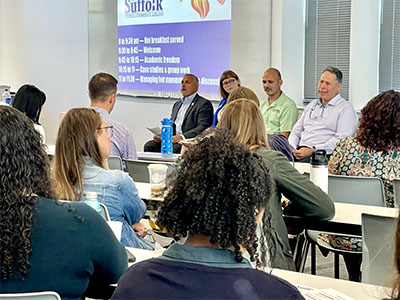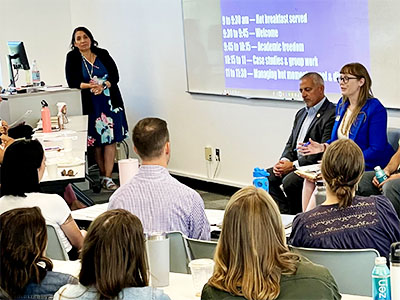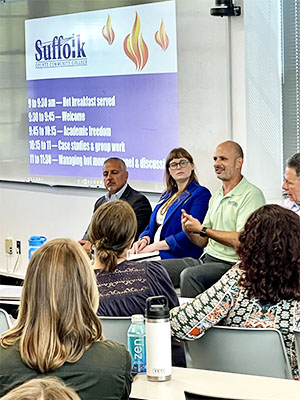October 2024
The following article is part 2 of a review of the September 13 Navigating Controversial Topics on Campus workshop; if you have not yet done so please also read part 1, Considering multiple perspectives, featuring comments by President Bonahue, Vice President for Academic Affairs Rios and Suffolk County Legislator Jim Mazzarella. Yes, there is freedom of speech granted by the First Amendment of the U.S. Constitution and, yes, we have academic freedom in Appendix B of the FA contract. However, to be absolutely clear, this does not mean that faculty have the right to say whatever they wish in their classrooms or workspaces on campus. Appendix B cites the AAUP’s 1040 Statement of Principles on Academic Freedom and Tenure which reads in part
Rights and responsibilities FA Grievance Officer Kevin McCoy presented the above language to the group and noted that academic freedom grants us certain rights as well as responsibilities—precisely because we are public employees. “Because SCCC is a unit of the state government and since we accept federal funding, we need to follow their rules,” he explained. We have the right of free speech but that comes with a responsibility to not abuse that freedom. “You cannot insert conversations about politics, political candidates, etc., into your classroom conversations if you are teaching an unrelated topic,” Kevin said. Again, because we are public employees, it is critical that we stick to our curriculum and specific course learning outcomes. Kevin knows in the current political climate, people have strong feelings and a sense of obligation about helping students become politically aware and engaged. “Of course we want to fight misinformation and work toward the truth,” he asserted, “but only if it relates directly to our work and we maintain an objective and respectful stance during conversations.” Echoing Legislator Mazzarella’s comments, Kevin concluded, “We need to remember to engage with all constituents/students, take in all opinions and work toward consensus.” A supportive administration College General Counsel Ashley Pope pointed everyone’s attention to the College Brief sent by President Bonahue on August 30, which includes a helpful overview of do’s and don’ts for political activity on campus.
Regarding faculty concerns about the investigation process, Ashley understands that some faculty might have an impulse to avoid certain course-related topics for fear of student complaints. “But,” she adds, “we do want people to express their opinions in appropriate contexts and we are extremely committed to being impartial and helping everyone understand why policies are what they are.” The FA encourages all faculty to join the union so if you find yourself in such an investigation, we can help represent you as you go through the process. Some of our most respected FA members have told us over the years that they were grateful to have a knowledgeable FA rep by their side through the process, providing comfort even when they trusted all along that they’d be found not at fault. Lifeblood of education
Nick Giordano, our one full-time political science professor at SCCC, put it bluntly, “Academic freedom is essential; it is the lifeblood of education.” Like Ashley, Nick believes it is imperative to not avoid controversial topics when they are pertinent to our course content and student learning outcomes. “We have to help students learn to think critically, learn it’s okay to disagree and learn how to disagree.” It’s about teaching them how to think, not what to think. “We live in a world where people only seek out information that supports our own preconceived notions, so when someone introduces a different perspective, they are less likely to know how to handle that and they take offense.” Kevin McCoy agreed, adding, “Students are used to the uncivil tone often promulgated on social media, so we have to teach them how to engage in civil discourse.” Finally, Nick noted, “When students ask me for my personal take on an issue covered in class, my response is consistently, ‘What I think is irrelevant.’” As a political science professor, Nick knows better than most that any way he responds could be misread as engaging in political activism in the classroom, so he presses students to focus instead on what they think, after much consideration, discussion and debate. Continue on to read part 3: Managing hot moments. |



